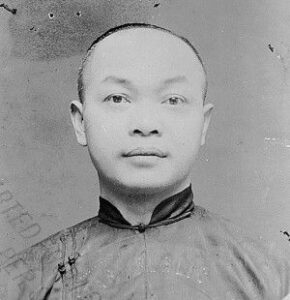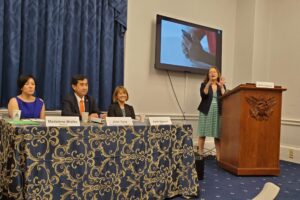
What Makes America Exceptional
by Ted Gong (first released in 9/2/2015)
Love him or hate him, call him a frank-talking politician or a narcissistic celebrity, Donald Trump has pushed the immigration debate to its fringes. And, Republican rivals, scrambling to be on his right, mean that extreme ideas will carry into the general elections. Foremost among the extremely bad ideas is eliminating birthright citizenship.
Though guaranteed under the 14th Amendment, critics believe a Supreme Court decision could overturn the guarantee. To test the Court’s position, they advocate for executive action or new federal laws to restrict citizenship to children born to parents who have citizenship and perhaps to parents who have legal residence status. The details are uncertain.
Thus, the first problem with such a law and ruling will be administrative. Does passing citizenship to a child born in the U.S. require both parents to be citizens, one parent, blood or adoptive parent, legal resident non-citizens, visitors impregnated by unmarried citizen partners or resident aliens? What is “legal residence?” Are we including people lawfully here on student visas, worker visas, protective or asylum status, or refugees? How about percentage of blood as in apartheid regimes? The variations go on.
More importantly, attacking birthright citizenship because of immigration concerns is misplaced. It provides a prescription to immigration that does not address its core issues. Unlike extending walls at our borders, or detaining and deporting foreigners without status, or requiring more documentation for workers for visas, these laws (regardless of one’s opinion of their desirability and effectiveness) do seek to regulate a proper flow of people into the United States. They do address issues of American economic needs relative to needs to protect American laborers. Removing birthright citizenship does none of that. It will have little if any impact on these key concerns but its consequences and implications to both immigrants and citizens are enormous.
Historically, birthright citizenship was the only protection that prevented Congress from exterminating the Chinese through six decades of increasingly harsh Chinese exclusion laws from 1882 to 1943. It was a Chinese exclusion case (U.S. vs Wong Kim Ark, 1898) that affirmed the principle of birthright citizenship under the 14th Amendment. Without birthright citizenship, any people can be denied equal protection of the law, marginalized or removed from the U.S. because of their race or beliefs. Congress tried to do that against the Chinese and later against all peoples from an Asiatic zone that extended from modern Korea, through India and Pakistan, to Turkey.
But, what makes birthright citizenship so enormously important to protect (and even to cherish) is in it defining who we are as an American people. In that regard, United States is an outlier –most modern countries do not practice birthright citizenship. But, that is precisely what makes the United States exceptional. Birthright citizenship embodies the founding American concept that individuals are worthy regardless of their parentage and previous conditions of servitude, social status or wealth. Every individual has potential to strengthen the United States as long as they accept American civic values. Central among them is that all Americans are born equal regardless of their parents.##




